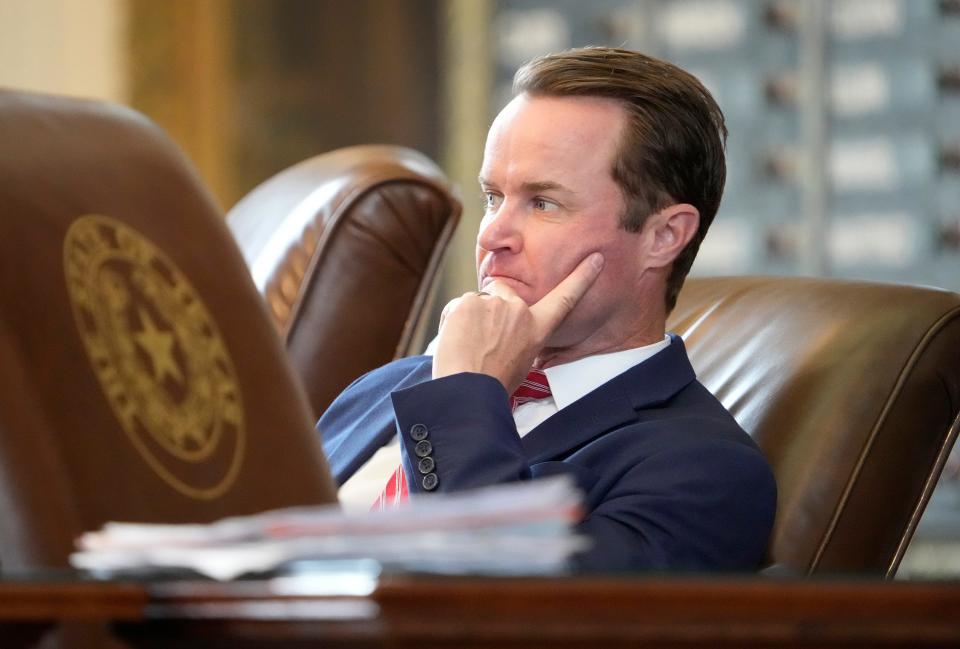Candidate for speaker calls Texas House 'dysfunctional.' Congress says, 'Hold my beer'
- Oops!Something went wrong.Please try again later.
- Oops!Something went wrong.Please try again later.
When he began his formal remarks announcing his intention to challenge the sitting speaker of the Texas House, the second word state Rep. Tom Oliverson, R-Cypress, uttered was "dysfunction" as he described the operation of the Legislature's lower chamber, run by Republicans, and why he's calling for a change in leadership.
And when he outlined his vision Thursday for how things would run if he is awarded the gavel when state lawmakers return to the Capitol on Jan. 14, Oliverson described a process quite similar to how the U.S. House of Representatives handles its business in Washington: The majority party runs the show, and the party in the minority likes it or lumps it.
A Google search containing only the words "Congress" and "dysfunction" will render a seemingly unending stream of hits with such titles as "The Painful, Depressing Reality of Why Congress Is So Dysfunctional," "Why dysfunction in Congress could be here to stay," "'Totally dysfunctional': Congress leaves town with chaos in its wake, but little actual legislation" and "The Cost of a Dysfunctional Congress."

In fact, since the 118th (and current) Congress convened Jan. 3, 2023, it took the U.S. House 15 tries over five days before it was able to elect a speaker and organize itself to tackle the people's business. And then that speaker, Republican Kevin McCarthy of California, was unceremoniously booted from the top spot 16 months before his two-year term was set to expire.
And then it took the U.S. House 22 days before deciding on a new speaker to complete that term. Members finally settled on Rep. Mike Johnson, R-La. Adding to all that drama, one day after Oliverson said, in effect, that the Texas House should model itself after its national counterpart, one of Johnson's fellow Republicans, Rep. Marjorie Taylor Greene of Georgia filed a motion to fire the new speaker with a bit more than nine months before the 119th Congress is elected and sworn in.
Greene, who's gained a reputation as a bit of a bomb-thrower in her three-plus years in Washington, admitted that her move was more symbolic than substantive. But it did nothing to counter the narrative that the 435-member chamber is more of a political pinball machine than it is a deliberative governing body constituted to carry out the will of its constituents.
An argument could be made that the Texas House, even at its rowdiest, looks like the most disciplined regiment in the U.S. Marine Corps compared with the U.S. House when it's supposed to be on its best behavior and has the nation's attention focused on it. You don't have to search far for a recent example. Just rewatch the March 7 State of the Union address.
Asked directly whether Texas should be following the Washington model for how to run a legislative branch of government, Oliverson answered without saying yes or no.
"I can't speak to how Congress does everything they do," he told reporters. "I would simply say that 99% of what we do in Texas is bipartisan."
Unsaid, however, was that ever since Republicans have had more than a token foothold in Texas — which from Reconstruction in the 1870s until the George W. Bush era in the 1990s was solidly Democratic — both chambers of the Legislature were organized without excluding the party in the minority.
That practice continued when Republicans gained control of the Texas Senate after the 1996 elections and when the House flipped to the GOP six years later. On the Senate side, Lt. Gov. Dan Patrick methodically chipped away at Democratic committee chairmanships after taking office in 2015 and ended the practice altogether when Democrat John Whitmire, the longtime chairman of the Senate Criminal Justice Committee, gave up his Senate seat Dec. 31 after being elected mayor of Houston.

When the current House speaker, Dade Phelan, R-Beaumont, won his second term at the helm of the lower chamber in January 2023, he resisted pressure to shut out the Democrats, and he used the dysfunction in Congress as his defense for giving the minority party a say in the leadership decisions.
But that defense apparently didn't sit well with many Republican voters in Phelan's district. He finished second in the March 5 primary, and his political life is on the line in the May 28 runoff. If he doesn't survive that, his bid for a third term as speaker will die.
Oliverson's argument for one-party rule, which mirrors the sentiment expressed by some GOP grassroots activists, is that Democrats have weaponized their comparatively small slice of the leadership pie to kill bills that are important to the conservative movement. And there's truth to that.
The flip side is that having a seat at the leadership table means less time for all-out warfare on every issue in every committee and on every bill that comes to the floor. No seat at that table leaves plenty of time for war. And Democrats will have little incentive not to wage it starting in January.
This article originally appeared on Austin American-Statesman: The Texas House 'dysfunction' has nothing on the House in Washington

